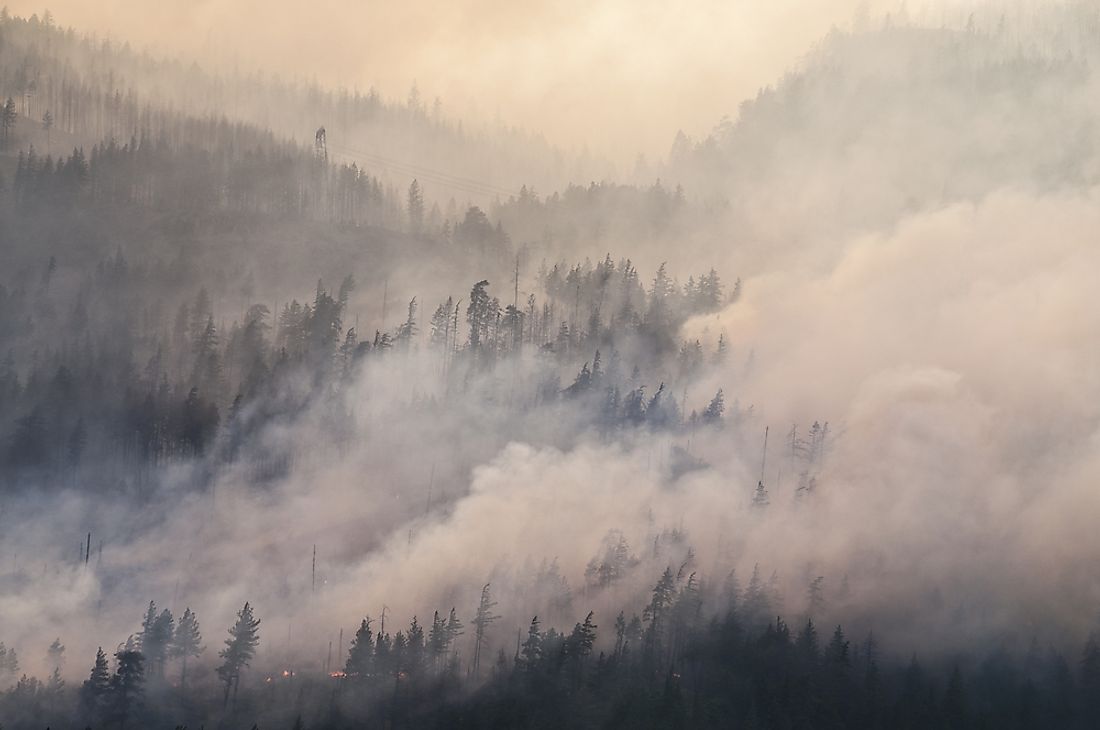The Deadliest Fires in Canadian History

Canada accounts for about 10% of the world's forest fires. In particular, the Canadian provinces of British Columbia, Alberta, and Saskatchewan experience more wildfires than other parts of the country. In 2018 alone, fires ravaged 1,298,454 hectares of forest in British Columbia, which can be compared with the 766,439 hectares destroyed by fire in the US state of California. Wildfires in Canada rarely encroach on human settlements, and therefore have resulted in limited loss of life and destruction of property, unlike California, where significant loss of life and property destruction have been reported in recent years. City and residential fires occur throughout the country, but well-developed fire suppression infrastructure help ensure that such fires are contained before they cause significant loss of life. The deadliest fires in Canadian history are discussed below.
The Three Deadliest Fires in Canadian History
Matheson Fire
The Matheson Fire was a forest fire that ravaged Iroquois Falls and Black River-Matheson in Ontario on July 29, 1916. It was common practice for farmers and settlers to clear land by burning bushes, but that particular summer was hot and dry with little rainfall, and the shrubs burned easily. Several fires that had been intentionally lit merged into a single firestorm and quickly overwhelmed firefighters. The length of the fire spanned for 40 miles and in a single day it had consumed the towns of Iroquois Falls, Porquis Junction, Ramore, Nushka, Matheson, and Kelse. A separate fire began in Cochrane, and within hours hundreds were trapped in between. Although most managed to escape, the fire caused 223 deaths.
1825 Miramichi Fire
The Great Miramichi Fire of October 1825 was a forest fire that ravaged across forests and communities in northern New Brunswick. The fire also destroyed one-third of residential houses in the city of Fredericton. The summer was exceptionally hot, and small wildfires were frequent. On October 7, 1825, a firestorm swept across Newcastle and reduced the town to ashes within three hours. Adjacent towns were similarly destroyed. Official estimates report the number of casualties at between 160 and 300, including inmates in the Newcastle jail.
Great Porcupine Fire
The Great Porcupine Fire was a forest fire that ravaged the Ontario Northlands in 1911. The firestorm was sparked by a series of small fires following an abnormally hot and dry summer. The fire assumed a horseshoe-shape and extended for 22 miles, destroying over 200,000 hectares. Preliminary reports indicated that over 1,000 people had died, but local officials later placed the estimate at between 73 and 200. Most deaths were caused by drowning, while seeking refuge at Porcupine Lake, or by suffocation in mines.
The Largest Fires In Canadian History
The largest fire in Canadian history in terms of area was the 2014 Northwest Territories fires. The firestorms swept across 3,400,000 hectares (ha) of forest, but fortunately did not result in any deaths. The Chinchaga fire of 1950 swept across 1,700,000 hectares of forest in Northern British Columbia and Alberta, and remains the largest single fire in North America to date. The 2018 British Columbia wildfires burned 1,298,454 hectares of forest in British Columbia, surpassing the province's previous record, which was held by the 2017 British Columbia wildfires.
The 10 Deadliest Fires in Canadian History
| Rank | Fire | Location | Deaths | Year |
|---|---|---|---|---|
| 1 | Matheson Fire | Black Rivr-Matheson, Ontario | 223 | 1916 |
| 2 | 1825 Miramichi Fire | New Brunswick | 160 | 1825 |
| 3 | Great Porcupine Fire | Timmins, Ontario | 73 | 1911 |
| 4 | Opemiska Community Hall Fire | Chapais, Quebec | 48 | 1980 |
| 5 | Great Fire of 1922 | Timiskaming, Ontario | 43 | 1922 |
| 6 | Great Vancouver Fire | Vancouver, British Columbia | 28 | 1886 |
| 7 | 1877 Great Fire of Saint John | Saint John, New Brunswick | 19 | 1877 |
| 8 | Saguenay Fire | Saguenay, Quebec | 7 | 1870 |
| 9 | 1900 Hull-Ottawa Fire | Hull, Quebec | 7 | 1900 |
| 10 | Great Fire of 1846 | St. John's, Newfoundland | 3 | 1846 |











